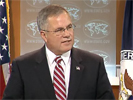
This post originally appeared on ForeignPolicy.com
Over the last nine months, the Sudan policy review has taken on something of a mythical air. Activists and others lost count of the number of times they were told the review would be completed "in weeks, not months" — even as months stretched on. Tales of sharp-elbowed infighting between the U.S. special envoy for Sudan, retired Maj. Gen. Scott Gration, and the U.S. ambassador to the United Nations, Susan Rice, dominated the narrative. So did a series of high-profile gaffes, ranging from the absurd — with the special envoy talking of handing out "cookies" and "gold stars" to Sudan’s ruling National Congress Party — to the just plain bizarre, as former National Security Advisor Bud McFarlane was found to be lobbying the administration to normalize relations with Sudan, after receiving $1.3 million from Khartoum passed through Qatar.
The Barack Obama administration was clearly eager to use the policy review as a chance to hit the much-needed reset button. Secretary of State Hillary Clinton was joined by Rice and Gration in a carefully choreographed show of internal unity at Monday’s rollout event, and everyone dutifully sang from the same song sheet. The public version of the policy is a modest five pages in length and says many of the right things. But it also reflects the bipolar views of an administration that, after nearly a year in office, still seems divided on Sudan.
Kicking off to a good start, the policy calls for a comprehensive approach to Sudan’s interlinked crises and notes the genuine risk of a return to wholesale warfare in the run-up to a 2011 independence referendum for South Sudan.
The document also goes to some lengths to dispel the notion that U.S. policy toward Khartoum has become too accommodating. It insists that incentives be offered not for gestures of goodwill, such as "the signing of a MOU [memorandum of understanding] or the issuance of a set of visas," but "rather based on verifiable changes in conditions on the ground." The policy review also institutes a quarterly, senior interagency review of "indicators of progress or of deepening crisis" as a means to calibrate incentives and pressures, with an admonition that "[f]ailure to improve conditions will trigger increased pressure on recalcitrant actors." The administration also offers an overdue acknowledgment that "accountability for genocide and atrocities is necessary for reconciliation and lasting peace."
Yet in many ways, the policy feels like an uncomfortable compromise between feuding internal approaches, producing something that is neither fish nor foul.
To continue reading, click here.
Photo: Sudan Special Envoy Gration at this morning’s briefing

